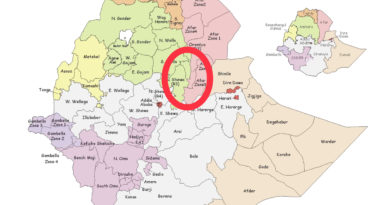Why Ethiopian Gospel Believers’ Churches Council Didn’t Work, and a Way Forward – Opinion
By Geleta Tesfaye | Yeroo Columnist
I am often reserved from asserting audacious statements about the challenges the Ethiopian Gospel Believers’ Churches Council has been facing from its conception to a recent breakup, because of the complexity of the issues it has been trying to handle.
Nevertheless, a discussion with friends on the nexuses between religion, politics, history, and culture in Ethiopia prompted me to forward my opinion on why the newly established Council didn’t work. In this opinion, I will first forward why the Council, from the beginning, was a trivial idea and didn’t work; and second, I will suggest what the gospel believers’ denominations under a Protestant umbrella should undertake to create a unifying body of gospel believers that represents every Christian tradition for the coming generation.
As we all know, there are two Christian traditions in the Council: “The Mainline Churches”, which were originally members of the Ethiopian Evangelical Churches Fellowship, and the newly formed Fellowship of Pentecostal Churches, a.k.a. Prophetic Movements.
I think nexuses between politics, history, and culture play a significant role in shaping a community’s religious formation (I am referring to any religion, including Christianity). From this viewpoint, religious practices are often social constructs. I am not only referring to their “central beliefs”, but also their modus operandi: the way lay practitioners of religion perform their faith is profoundly influenced by their social norms, history, and context. To understand any religious tradition, it is, therefore, obligatory to have a comprehensive understanding of the political, cultural, and historical contexts in which they were established.
Let me start from analysis of the mainline protestant churches in Ethiopia.
As we all know, the mainline Christian traditions in Ethiopia, such as Lutheranism, Calvinism/Reformed, Baptists, and even classical Pentecostalism are established in another context than the Ethiopian (African) settings.
First, they were European Reformation churches, heavily inclined to medieval European culture, politics, and history. The Reformation did not happen in a vacuum, it was a religious movement within European culture and history. Some individuals who’re influenced by these traditions tend to mistake what they call “Biblical” with these traditions. Often, we are not even aware of our naivety in this regard. I think it entails a philosophical and historical deconstruction of their theologies to disperse these medieval European elements from the gospel.
Second, these mainline churches often have tightly codified doctrinal declarations. In some traditions like Lutheranism, they place a heavy emphasis on creeds and dogmas. I think emphasizing the authenticity of the gospel by itself has no problem; however, as I indicated above, these dogmas and creeds are highly saturated in the political, and historical contexts of their original practitioners, and often they’re not compatible to other contexts.
For example, the highly emphasized Calvinism—Arminianism—Molinism debate among the mainline churches is highly medieval European; it was designed to confront a corrupted medieval church’s teachings—and it worked well for them. But when it comes to contexts like contemporary Africa, where we have other kinds of problems, almost it has no significance for the lay population.
Since pre-colonial Africa had its spiritual epistemology, the post-colonial African populace is inclined to their roots: they aspire for salvation from different kinds of social and spiritual evils. Compared to European Christianity which only emphasizes the emancipation of spirit and soul, African spirituality had encompassed a wide range of emancipations.
The problem with the mainline churches, in my opinion, is therefore their attempt to apply these medieval European Christian traditions and norms, doctrines, and worldviews in different contexts like post-colonial Africa.
One may argue that Ethiopia was not colonized, and its context should not be considered a post-colonial Africa. However, I would respond that protestant saturated areas in Ethiopia like the southern and western parts have similar religious contexts to the rest of Africa. Regarding the northern part of the country, the Ethiopian Orthodox Tewahido Church has shaped its culture and norms, and in turn, the area’s culture, history, and politics have shaped the church. I think the reason why the EOTC hasn’t penetrated into other areas of the country is that since the church is heavily interconnected to the northerners, their attempt to bring the religion to the rest of the country would be an acculturation of the northerners’ social norms than the gospel.
Now, both protestant saturated areas of Ethiopia and Africa have one thing in common: they both are in a protest against acculturation in the name of religion. Even though the Ethiopian mainline churches’ lay population accepted these European versions of Christianity like Lutheranism and Calvinism, their spiritual need is not quenched. They are in a different context to that of the Reformation churches. Their challenges are different, and their history of spirituality is different.
I think this is the reason the post-colonial Pentecostal Christianity a.k.a. prophetic movement has dominated the African religious atmosphere and Ethiopian Protestantism in particular. Unlike other Christian denominations like EOTC, Catholicism, Lutheranism, Reformed/Calvinism, and others which emphasize prescribed dogmas and strict religious codes, this Pentecostalism is highly versatile as it emphasizes speaking its messages through languages and cultures of the lay populace. In contexts like post-colonial Africa, this is a golden opportunity for it to penetrate into people’s hearts because it is utilizing their social norms and contexts to spread its desired message. Pentecostalism emphasizes on immediate problems of a society.
We see these prophetic movements decidedly welcomed by local communities and became their chosen expression of spirituality against European-dominated mainline traditions. As a result, they aroused a lay consciousness independent from “mainstream” church theologies. Likewise, it is no wonder that lay practitioners in the mainline Christian traditions like Lutheranism, Reformed and others are heavily inclined to the Pentecostal modus operandi, and we find a Lutheran or Reformed pastor speaking in a tongue in public and prophesizing.
However, Pentecostalism’s adaptability toward social norms has brought grave dangers into post-colonial African Christianity. It has opened a wide portal of syncretism for worldviews from traditional religions to enter; and we have these proliferated waves of the mixed gospel and African traditional religions, which has become a serious threat to the authenticity of the global message of the gospel. This has become the foremost worrisome for the mainline church leaders.
In this opinion, I have forwarded insights into why the Gospel Believers Churches’ Council has failed: it tried to bring together highly European Christian traditions of the “mainline churches”, and the new heavily African post-colonial Pentecostalism. These traditions are incompatible both in their formations and practices, and the result? The council failed.
Now, what is a way forward?
I think Ethiopia’s Protestantism has faced a serious challenge that entails a thorough engagement of its leaders, theologians, and biblical scholars alike to assert their efforts to create a new inclusive atmosphere for both of these Christian traditions for the sake of the coming generation. I suggest the following:
- The “mainline” Christian traditions like Lutheranism, Reformed, Baptists, and others should deconstruct, and decolonize their theologies and modes of operation. Their rejection of the contemporary post-colonial version of Pentecostalism might have arisen from their allegiance to their European traditions and roots. Often, we tend to mistake the gospel for our Christian traditions.
- The proliferating post-colonial African Pentecostalism should clear up blurry lines between cultural beliefs and the global message of the gospel. Its mere emphasis on the utilization of contextual norms has created syncretistic chaos that requires an integrated effort from all their leaders, theologians, and biblical scholars to clear up. If it Christianizes the whole world and lost the authentic gospel of Jesus Christ, what is the point of its evangelizing after all?




